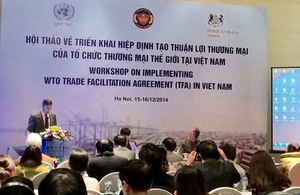UK supports Vietnam in implementing WTO’s Trade Facilitation Agreement
A workshop organised in Hanoi was part of the project funded by the UK’s Prosperity Fund for the General Department of Vietnam Customs.

British Ambassador Giles Lever opened the workshop
The General Department of Vietnam Customs organised a workshop to introduce an overview of, benefits and challenges, as well as requirements to implement the Trade Facilitation Agreement (TFA) of the World Trade Organisation (WTO). The workshop was also an opportunity to introduce Vietnam’s commitments under this agreement, and to analyse the benefits which Vietnamese business community will enjoy from the implementation of the Agreement.
The workshop organised in Hanoi from 15 – 16 December 2014 was part of the project funded by the UK’s Prosperity Fund for the General Department of Vietnam Customs (GDVC). British Ambassador to Vietnam Giles Lever and GDVC Deputy General Director Vu Ngoc Anh opened the workshop. Two experts from the United Nations Conference on Trade and Development Jan Hoffmann and Peter Faust and more than 100 representatives from line ministries, universities, businesses, central and local customs officials, and some domestic and international organisations attended the workshop.
In his opening remarks, British Ambassador Giles Lever emphasised that as one of the world’s leading trading nations, the UK has a business-friendly customs environment, and deep experience in trade facilitation and modernisation.
The British Ambassador continued:
I am happy to support the GDVC’s efforts to prepare for implementation of the WTO Trade Facilitation Agreement in VN. This project is the result of a bid to the UK Foreign Office’s Prosperity Fund and was successful in the face of strong competition. We believe that it will create the conditions for effective and efficient implementation of the commitments in the TFA in the near future.
We expect discussion in the TFA workshops in Hanoi today and in Ho Chi Minh City on 18 – 19 December will ultimately contribute to concrete recommendations to the Government that will (1) encourage closer global and regional economic integration on non-discriminatory basis, in line with international economic rules; and (2) break down the barriers to cross border trade and investment and help improve the regulatory business environment.
A similar workshop will be organised in Ho Chi Minh city from 18 – 19 December.